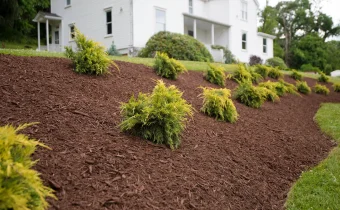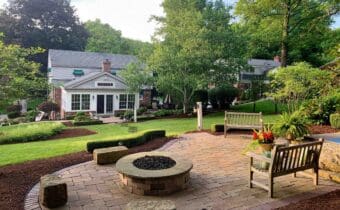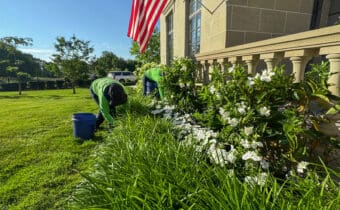Throughout the year, there are a few reasons to prune shrubs such as to maintain the size, improve its appearance, or remove dead wood. All of these purposes are beneficial to keep a plant healthy year after year.
However, late winter is a wonderful window of opportunity where many trees and shrubs are dormant so we can prepare them for vigorous spring growth.
In Pittsburgh, we are in USDA plant hardiness zone 6 which means that winter can come earlier than normal or stay later than normal. Keep this in mind when timing your winter pruning and when in doubt, ask a Pittsburgh landscaping professional for guidance.
There are three types of winter pruning including: Rejuvenation, Reduction, and Corrective pruning.
Rejuvenation Pruning
Winter rejuvenation pruning, also called hard pruning, will remove old, thick, or otherwise unproductive limbs from a vigorous type of shrub.
Usually this is required when a plant has gone natural for a long time, completely overgrown its space, and was neglected. Instead of removing and replacing the shrub, you can correct it by removing vines or other woody weeds within the shrub.
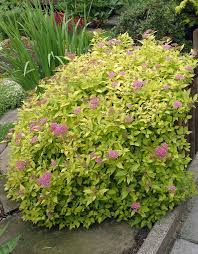 This type of hard winter pruning will cut back the whole shrub to the ground, or 6-12 inches from the ground this winter. The shrub will rejuvenate quickly and the following year normal pruning can begin.
This type of hard winter pruning will cut back the whole shrub to the ground, or 6-12 inches from the ground this winter. The shrub will rejuvenate quickly and the following year normal pruning can begin.
Plants that typically require winter rejuvenation pruning include:
- Spirea
- Honeysuckle
- Pussy Willow or Arctic Variegated Willow
- Lilac
- Red or Yellow-twig Dogwood
- Weigela
- Forsythia
Hard prune in the late winter, before any buds begin to open. But, use caution when diagnosing this type of pruning. It’s easy to do, but best diagnosed by a Pittsburgh landscaping professional.
Reduction Pruning
In winter reduction pruning the end result is a reduced size or changed shape of the overall plant. This is a very particular type of pruning that should be done by someone with a green thumb or horticultural knowledge.
This type of reduction pruning works well for plants like:
- Knock Out Roses
- Burning Bush
- Panicle Hydrangeas
- Viburnums
- Weigela
- Bayberry
- Rose of Sharon
This technique is great for controlling size and shape, however it’s not a substitute for planting the correct plant in an ideal spot to begin with. Consult with your professional Pittsburgh landscaping team to determine whether or not it makes sense to perform winter reduction pruning or simply remove and replace with a more fitting specimen.
Corrective Pruning
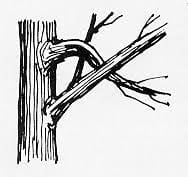 The purpose of winter corrective pruning is to remove any crossing or rubbing branches, codominant leaders, or branches with too narrow of a crotch angle.
The purpose of winter corrective pruning is to remove any crossing or rubbing branches, codominant leaders, or branches with too narrow of a crotch angle.
Plants damaged by disease or insects may also require corrective pruning to remove the damaged branches. Always clean your shears or pruners with Lysol in between EACH and EVERY cut to ensure that you’re not spreading the disease or virus to the healthy parts of the plant.
As a homeowner, you will notice when a tree or shrub needs corrective trimming by locating the branches and how they flow outwards from the plant. This is best identified in winter time when there is less foliage to block your view.
Plants that typically require corrective winter pruning include:
- Knock Out Roses
- Wisteria
- Japanese Maple
- Pyracantha
Corrective pruning can be done on any type of woody plant, just keep in mind that the sooner it is done, the better.
Overall, pruning your shrubs in the winter is easier because you can see the framework of the plant without leaves and the removed branches are not near as heavy. The frozen ground allows for minimal damage to surround plantings or the lawn, especially if heavy equipment is needed for access.
If you’re not that confident with pruning, contact our professionals at Dream Greener Lawn & Landscape to get signed up for a winter trimming and pruning for your Pittsburgh landscape today!
